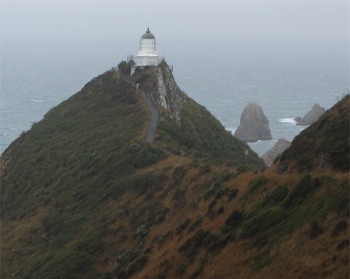 Nugget Point Lighthouse in the Rain |
I sailed through Milton, and then breezed south through farmlands to Balclutha, the entry point to the Catlins. Balclutha, (Gaelic for "Town on the Clyde"), sits on the Clutha River, New Zealand's largest by volume of water, and provides a major share of the country's hydro generated electricity.
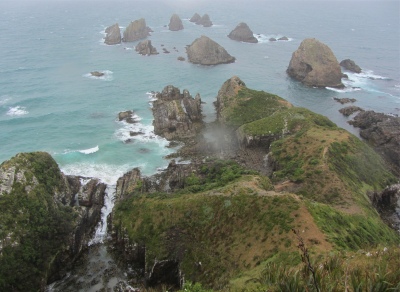 Troubled Seas Below Nugget Point |
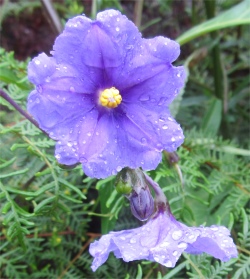 Cliff Flower on Nugget Point |
The Catlins was a major highlight of the Southern Scenic Route which continued on to Te Anau in Fiordland. The awesome natural beauty kicked in at the growing seaside town of Kaka Point, some 20 minutes south east of Balclutha. Shortly after Kaka Point I parked up and walked along a track to the dramatic Nugget Point, a windswept promontory, and its lighthouse, which first began operating in 1870. Just past the lighthouse, the ground dropped away 133m via breath-taking cliffs to the thrashing ocean below, with the jagged Nuggets stack of rocks stranded in a foaming cauldron just offshore. Gannets, shag and spoonbills wheeled overhead, their squawks endeavouring to compete with the roar of the waves. Fur seals, sea lions and elephant seals on the rocks below added to the cacophony.
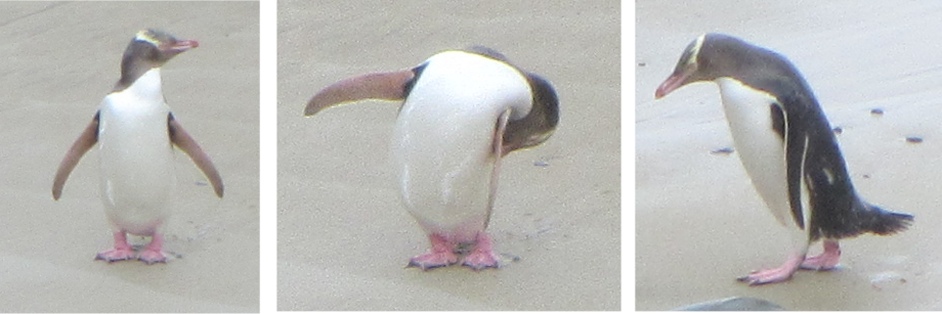 The Yellow-eyed Penguin at Roaring Bay |
I drove on and took a turnoff down a gravel track to Cannibal Bay. This delightful long crescent of sand was reputed to be a great beach to observe New Zealand sea lions hauling themselves ashore before they idled away their time lazing and sleeping in the sand dunes. Today, I had all the beach to myself, and a couple of wading birds and a small mob of gulls, but no sea lions.
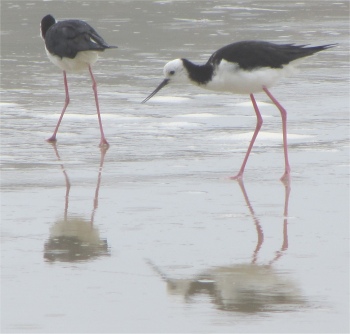 Oyster Catchers at Cannibal Bay |
I tootled along more gravelled narrow roads, passing fields full of cows or gleaming, newly shorn sheep, without a care in the world, to the small urban sprawl of Owaka, "the place of canoe", the largest and main service town for farming, forestry, and rapidly growing tourism in the Catlins, with a population of almost 400 people (only 1200 people now lived in the Catlins). Services in Owaka included a garage, medical centre, pharmacy, a quilt shop, and a supermarket; not bad considering the size of it. If I had blinked I would have missed this crossroads.
I diverted down more gravel tracks towards Jack's Bay and walked a farmland track to Jack's Blowhole, a 55m-deep hole in the ground, which connected to the sea via a 200m tunnel. No doubt this was the collapsed roof of a cave. Apparently, with the right tidal conditions, water would spout out of the hole. This breathing blowhole reminded me of a similar blowhole I had come across in the Wupatki National Monument, Arizona, though that was about 700km away from the ocean, and much smaller. The cauldron was aptly named after Chief Tuhawaiki, nicknamed Bloody Jack for his cussing.
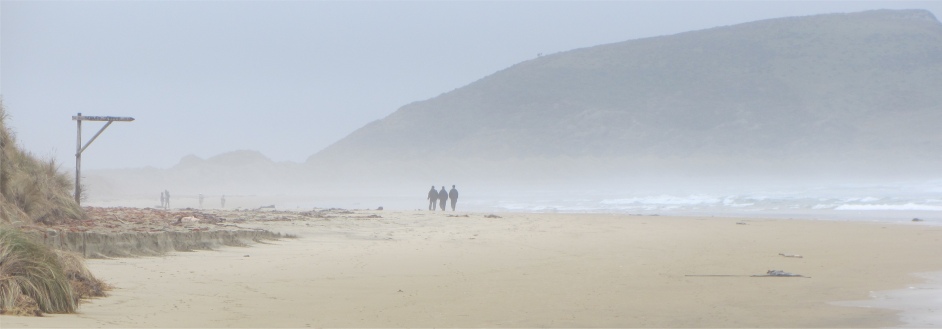 Tussock, Sand, Breaking Waves and Thunderous Roar at Surat Bay |
It was darkening quickly, so I checked out sites to camp at, picked one out on the outskirts of Owaka and headed straight for it. It was in reality a small piece of land behind an inn. "$5 for the night, toilets and showers in there," said the guy. I took it. Not long afterwards another soul smothered in waterproofs arrived at the campsite, wet and bedraggled. It was absolutely teaming it down, and there was no camper's kitchen at the inn, so I retired to the bar for food and drink.
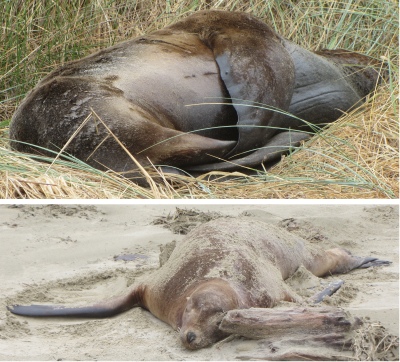 New Zealand Sea Lions at Surat Bay |
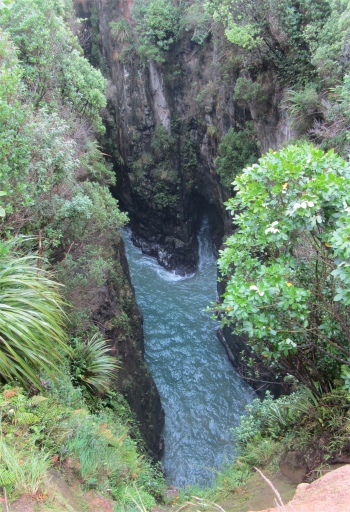 Jack's Blowhole |
She was an attractive young woman, with strong facial features and an olive skin, of an age around the mid-20s I'd say. She had been hiking along a poorly marked trail in one of the forests, and had disappeared up to her thighs in mud, but she laughed about it. Her trip through New Zealand was of 6 month duration, and she was half way through. "Where are you from?" I asked, intrigued by the accent I couldn't recognise. "Israel," she replied. "I work as a web designer for a large travel company. The work is fairly repetitive, and there is no scope to use my imagination, but it is a job. I managed to get the six months off to travel." "Do you want to return back to Israel, or would you consider extending your visa and spending more time here, perhaps even working here?" I asked. "I'm not sure. I would be financially better off here I think. The minimum wage in New Zealand is far more than that in Israel, and it is expensive to live in Israel. A lot of our taxes go towards defence budgets, so you see we have our problems just as Europe has its."
We compared notes on our countries, on the places we have visited, the campsites, and then we talked about our transport. She too was traveling in a wagon like mine, but also carried a tent. She had bought the vehicle at one of the places I had researched and had visited in Auckland. "I didn't like their setup, I could see the scam and I wouldn't trust them as far as I could throw them," I told her. She too had sensed shady dealing, but had been "tricked" into buying the vehicle. She'd also had to get repairs carried out on her journey, and had the hassle of selling it in April. "Don't try and sell it through the same outfit," I said, "because they do nothing to work towards the sale. You will be shelling out $95 every three days, and when it is not sold by the time you leave, they will probably offer you $50 for it. Try and sell it over the internet."
I summoned the young fellow behind the bar and asked him for the web address of the New Zealand equivalent of Craigslist.com. "Trademe.co.nz is the one we use. You can sell at a fixed price, or you can sell through an online auction - you set your own reserve price," he explained. "It shouldn't make much difference in Auckland about when you sell, people are always trying to buy there. Since there are lots of vehicles up there, you won't get as good a return as say selling down here," he added. "But there are more buyers up there," I chipped in. "True," he said. We thanked the chap.
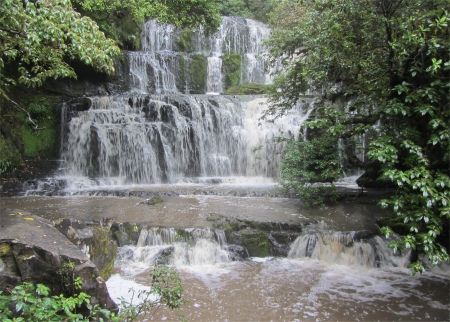 Purakaunui Falls |
The young woman asked me if I played pool, and so we had a game. The young fellow from behind the bar challenged the winner, so when she beat me, the two took over the table. I leant against the bar, while the bar lady was collecting a load of tickets from all over the bar. "I don't suppose they'll be wanting these," she said, "they must have all lost." "Are they betting slips from that machine over there?" I asked, pointing to an ugly blue machine in the corner, lurking below screens full of horse races and results. "Yes. They earn their money, and come and blow it on the horses and drink," she said, raising her eyes to the sky. "But you must be coining it in from the machine," I stated. "No, we get nothing from the machine. The company that owns it gets the takings. We just get the monies from the drink," she replied. I told her how I noticed a lot of gambling machines all over New Zealand. She didn't like the gambling, and would often try and get the punters to stop when they were winning before they lost it all again, just like they tried to get them to stop drinking when they had clearly had one too many. The inn was quite social minded, and would drive people home when asked by those who could no longer drive themselves home, or at times insisted they drive customers home. It happened a few times during the evening. What community spirit I thought.
I don't know how the pool players got on, but they had gone their separate ways, and I wended my way back to the wagon in a downpour, warmed by the fact that I'd taken the step to start up the conversation. Pulling the guy behind the bar and the land lady in to the conversation rounded it off well, and I'm sure the young woman appreciated it.
